
Vol. XXIV, No. 6, October 2024
- Editor's corner
- The latest on Bowlero
- Changes in face-to-face socialization
- How large is the location-based entertainment & arts market?
- The continuing stratification of location-based entertainment & museums
- Want to stay up to date on VR and the impact of AI on LBE businesses?
- Choosing a location-based entertainment designer
- The latest on work-from-home
- Getting to know Gen Z: A guide
Getting to know Gen Z: A guide
You may feel that you have just begun to understand the Millennial mindset: their tastes, what they care about, and what drives their choices. Just as you get comfortable, here comes Gen Z, coming of age and bringing their unique traits to the consumer marketplace and location-based entertainment venues. Let's dive into who Gen Z is, what they want, and, most importantly, how to engage them as customers.
Gen Z is typically considered to be made up of individuals born between 1997 and 2012, making them 12-27 years old. The oldest are already buying houses, entering the workforce, and having families (it's OK if you need a moment to let that sink in). Meanwhile, the youngest are on the cusp of adulthood and becoming consumers in their own rights. Like all generations, they are influenced by the technological and socio-political climate into which they were born. And while there are shared traits, each Gen Z individual brings their own unique perspective.
Gen Z are now 44% of what is considered the young adult market.
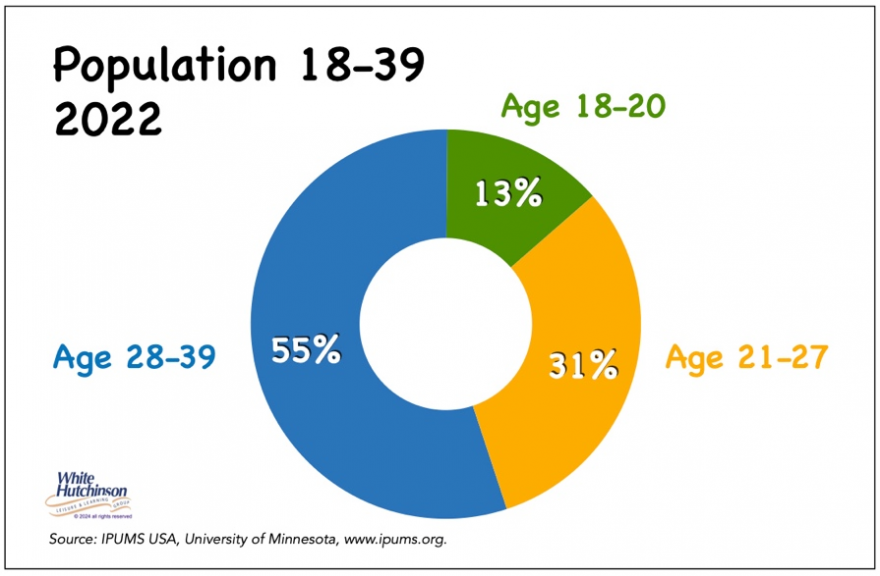
Digital Natives
Gen Z is the first generation to grow up with the internet, which makes them extremely comfortable online. They instinctively turn to digital solutions to their daily problems. They spend around 9 hours a day glued to screens. They are not simply comfortable being online; it is their default.
Environmental Concerns
Gen Z has grown up with the concern over climate change being a daily part of their life. As such, they are a very eco-conscious cohort. In fact, at age 21, one of today's most well-known and vociferous climate activists, Greta Thunberg, is a Gen Zer. Human-caused climate change is having widespread and significant negative effects on young people's mental health. A new study in The Lancet Planetary Healthof about 16,000 young people between the ages of 16 to 25 across America found that 85% of respondents are at least moderately worried, with about 58% "very or extremely worried," about climate change and its effects. 38% said their feelings about climate change were interfering with their daily lives.
As the youngest cohort of adults, it is understandable that the planet's future weighs on their minds.
Mental health, social equity, and an uncertain future
Having come of age during significant social movements such as Black Lives Matter and #Metoo, as well as the challenges of the global pandemic, inflation, and an ever-widening income gap between the wealthy and the middle class, Gen Z is often more politically progressive and more concerned with social and racial equity than prior generations. This is also most likely the reason that in their 2023 State of Gen Z report, the Center for Generational Kinetics found that 48% of Gen Z believe that the odds are stacked against them (compared to 38% of the total population).
Growing up in a swirl of complex social issues compounded with the 24/7 digital access to news and information has produced a generation that is much more complex and nuanced than the typical stereotype of "kids these days" with their heads buried in their phones. In the U.S., they currently comprise 20.7% percent of the population, just slightly more than Baby Boomers (20.9%) and one percent less than the largest cohort, Millennials (21.7%). As Boomers and Gen X continue to age, this new generation will become an increasingly large and significant share of the consumer public.
Fortunately, it isn't all doom and gloom with Gen Z. Just like any young generation, they remain adventurous and eager for new experiences. They're looking for meaningful interactions that resonate with their values. But of course, they will put their own Gen Z spin on it.
Food and Beverage
Regarding food and beverage, Gen Z is looking for something new. Like their Millennial predecessors, they are adventurous and experimental, always looking for something they haven't tried before. They are more likely to try a new beverage, new dish at a restaurant or a new restaurant or bar than other adults. They want to try new flavors and cuisines.
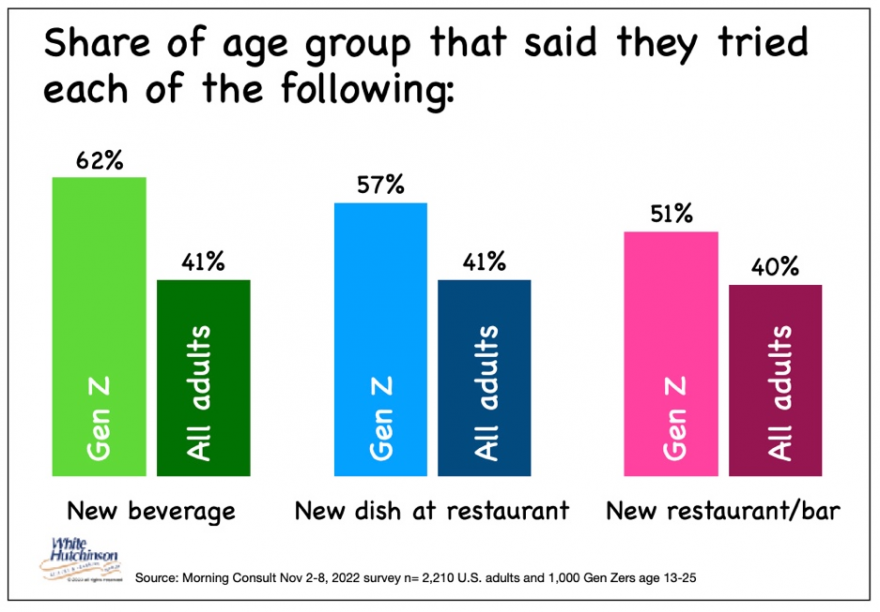
Gen Z is also the driving force in the growing "sober curious" movement, which is having a profound effect on alcohol sales and how alcohol is viewed in general. A 2018 Berenberg Research report found that Gen Z is drinking 20% less alcohol per capita than Millennials, who in turn consume 20% less than Gen X did at their age. An October 2023 Harris Study of 21-34-year-olds (Gen Z and younger Millennials) found that 57% had decreased their drinking from the prior year. A 2023 Gallup poll found that the percentage of adults under 35 who drink has decreased from 72% to 62% over the last two decades.
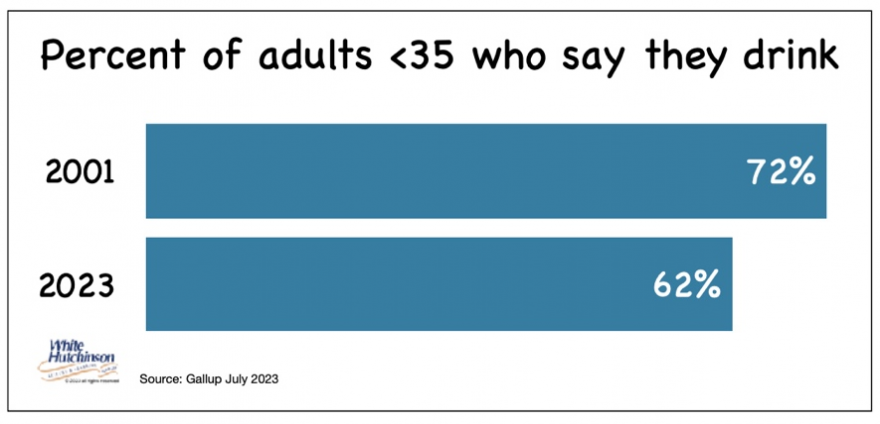
Their reasons for not wanting to consume alcohol include a fear of losing control, the expense of drinking, and the potential to feel adverse physical effects, including a bad hangover. This mindset that alcohol is damaging to one's health has already been seen with Millennials and is only increasing with Gen Z.
In conjunction with this decrease in alcoholic consumption comes a rising interest in no and low-alcohol beers, wines, and mocktails. Just like their interest in trying new food and drinks, GenZ looks forward to limited time offerings of non-alcoholic drinks more than any other generation.
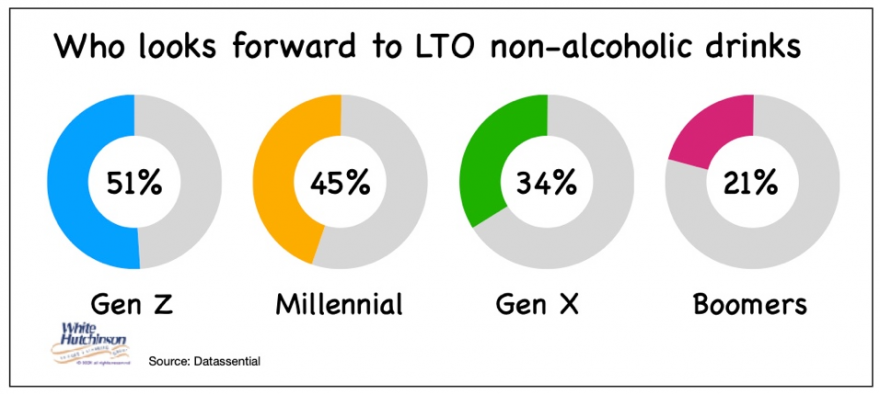
Over the last several years, the non-alcoholic beverage industry has exploded. Non-alcoholic beer sales in U.S. grocery, convenience, and liquor stores have nearly tripled since 2019. The hottest beer in America now doesn't have alcohol. Athletic Brewing has become the country's king of non-alcoholic beers, recently passing Heineken and Budweiser as the No. 1 brand by sales in U.S. grocery stores. In fact, at Whole Foods Market, Athletic now sells more than any other beer, including the ones with alcohol.
Gen Z is a significant driver in this change. According to a January 2024 Civic Science survey, over 33% of Gen Zers (age 18-27) had purchased a mocktail in the last 30 days, compared to 18% for Millennials and only 4% for Boomers. A good selection of low and non-alcoholic beverages is a must for any venue wanting to appeal to this generation.
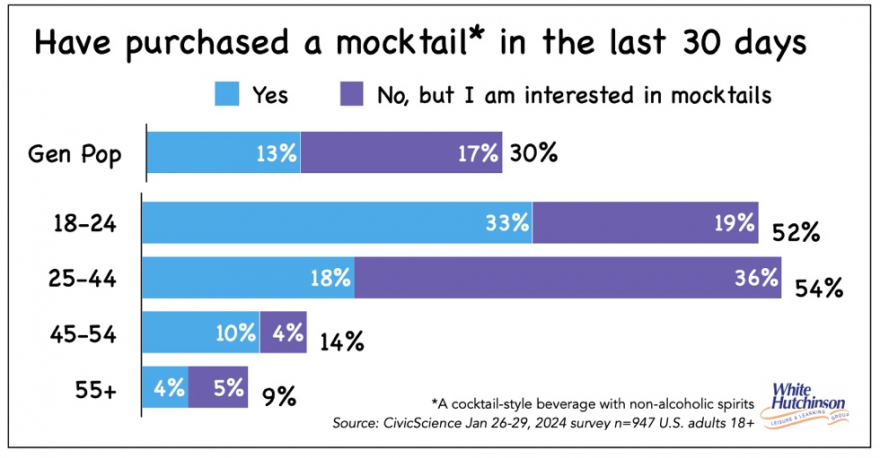
Experiences over things
Despite the weight of the world that has been thrust on their shoulders, or perhaps because of it, Gen Z is seeking experiences that are rich, meaningful, and fun. Although they may not have even been born when Pine and Gilmore first wrote about the experience economy in 1998, they are quickly becoming its target market. According to a Goldman Sachs survey, 70% of Gen Z value experience over things.
Probably more than any other generation, the pandemic and subsequent lockdown have given them a pent-up demand for out-of-home experiences. In a study by LaneTerralever and IAAPA, 50% of Gen Z visitors plan to go to even more attractions in 2024 than in 2023, making them (along with affluent visitors) the demographic with the most positive sentiment this year.
How to reach Gen Z
Make it convenient - With their digital proclivities, a strong online presence is vital to courting Gen Z. Instagram, TikTok, and YouTube have the most decisive influence on Gen Z's shopping habits, and 60% of TikTok users are Gen Z. But being present isn't enough. For these digitally fluent consumers, ease of use is a priority. They will easily turn to your competitors if you aren't providing them with a seamless and convenient digital platform.
Make it authentic - As a generation raised on social issues, Gen Z values authenticity. They will see through "greenwashing" or other artificial attempts to appear in line with Gen Z values, so aligning your messaging with genuine values and practices is crucial.
Make it adventurous - Gen Z wants to try new flavors and new experiences. They are also the generation most concerned with limiting alcohol consumption, so go wild with new and innovative mocktails.
Make it fun - After all, they are young adults. Let them get to know you through social media. Give them seamless access to your offerings with an intuitive (and mobile phone formatted!) website or app. Draw them in with rich, authentic social experiences with high-quality, innovative food and low or no alcohol beverages.
Ultimately, no matter our generation, one thing remains clear: we all crave connection and community. By understanding Gen Z's unique traits, we can better attract them to our location-based entertainment venues and engage them as customers.
Subscribe to monthly Leisure eNewsletter
Vol. XXIV, No. 6, October 2024
- Editor's corner
- The latest on Bowlero
- Changes in face-to-face socialization
- How large is the location-based entertainment & arts market?
- The continuing stratification of location-based entertainment & museums
- Want to stay up to date on VR and the impact of AI on LBE businesses?
- Choosing a location-based entertainment designer
- The latest on work-from-home
- Getting to know Gen Z: A guide



